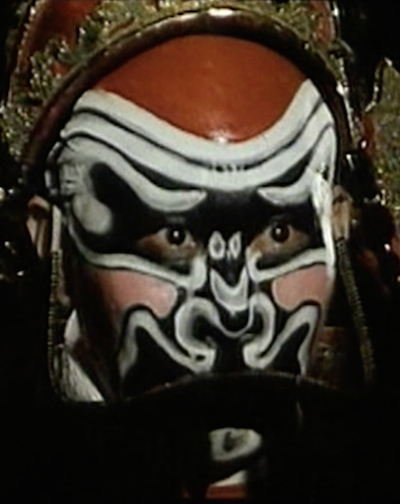Thursday, August 10, 1989
WOMAN DEMON HUMAN. Co-written by Zhiyu Li and Guoxun Song. Music by Yang Mao. Co-written and directed by Huang Shuqin. Running time: 106 minutes. In Chinese with English subtitles. No B.C. Classification.
Reviewed with:
THE BIG PARADE. Written by Gao Lili. Music by Qu Xiaosong, Zhao Qiuping. Directed by Chen Kaige. Running time: 95 minutes. In Chinese with English subtitles. No B.C. Classification.
IN BETTER TIMES, THEY came by day.
In 1984, after months of punishing drill, units of the Chinese military paraded in Beijing's Tiananmen Square to celebrate the 35th anniversary of the Peoples Republic.
Later, they would come by night. Not 10 weeks ago [June 4, 1989], an armoured battle group "restored order" in the Chinese capital by violently clearing the square of protesters.
The June assault came as a shock. Pundits, who had been surprised by the boldness of the students, now muttered darkly about a new cycle of repression in the world's largest nation.
All of which serves to lend poignance to the line actor Wu Ruofu, playing Chinese army recruit Lu Chun, hurls at his drill instructor in director Chen Kaige's The Big Parade (1987).
"People want their individuality," Lu tells military careerist Sun Fang (Sun Chun). "Times have changed."
Indicating how they had changed were the stirrings in the world of dianying, the vigourous New Chinese Cinema. Indeed, the six features on view starting tomorrow [August 11, 1989] at the Vancouver East Cinema were picked to showcase the change.
Before the June 4 massacre, Chen's probing service drama, with its barracks humour, questioning attitude towards parade-square extremities and mildly mocking approach to the big parade itself, indicated movement towards a more open society.
The same could be said of Huang Shuqin's Woman Demon Human (1987), a backstage drama focusing on an actress and her search for self-fulfilment. The child of travelling players, teenaged Qiu Yun (Gong Lin) defies her foster father (Li Baotian) to take to the stage when it becomes obvious that she is "a born performer."
Wilful as well as talented, the adult Qiu (Xu Shouli) finds fame playing demon roles in traditional Chinese opera. Her story begins and is punctuated by scenes of her triumphant performance as Zhong Kui, the matchmaking King of the Ghosts.
Huang is proposing a symbolic equation in which the woman, by taking control of China's ancient (male) demons, emerges fully human. Like director Chen's soldier, Huang's actress is saying that times have changed.
Unlike the soldier, she says it to herself. Like Huang, Qiu is a survivor of the Cultural Revolution, an event that is mentioned in dialogue rather than depicted.
In the process, Qiu learned to wear the mask of tradition and live for another day. Her tale suggests that China's new cinema may well be hunkering down today and preparing for "new" new cinemas to come.
* * *
HISTORY ON THE RUN. It may be some time before the events of June 4 [1989] are mentioned in a Chinese movie. Taiwan is another matter. Already in production is We Shall Return, a drama based on the massacre.Developed by Hong Kong director Patrick Tam, the picture will tell the story of a soldier in the Peoples Liberation Army whose girlfriend is a student at Beijing University.
The above is a restored version of a Province review by Michael Walsh originally published in 1989. For additional information on this archived material, please visit my FAQ.
Afterword: Revered as the Chinese Joan of Arc, Qiu Jin was a revolutionary, a feminist and a writer born into a society inhospitable to such activities for women. Nevertheless she persisted, taking the legendary Mulan as her inspiration in opposing the absolute rule of the Qing Dynasty. Qiu went into exile in Japan where, in 1905, she wrote a manifesto called A Respectful Proclamation to China's 200 Million Women Comrades. True to her beliefs, she returned home to incite dissent. In 1907, she was publicly beheaded in Shanyin.
Qiu Jin's heroism is a point upon which the cultural leaders in Hong Kong, Taiwan and the People's Republic all agree. Her story has been told in director Kuang-Chi Tu’s Qiu Jin, a 1953 feature shot in Hong Kong, and in a 1984 biographical drama, also titled Qiu Jin, shot in Shanghai under the direction of Xie Jin. More recently, her life was the subject of director Herman Yau’s 2011 epic The Woman Knight of Mirror Lake (Jian hu nu xis Qiu Jin).
Though certainly in the tradition of Qiu Jin, director Huang Shuqin’s Woman Demon Human was directly inspired by the story of Hebei opera star Pei Yanling. Born in 1947, Pei was a child of the revolution, becoming a popular opera prodigy at the age of nine, and performing a few years later for Chairman Mao Zedong. She’s been hailed by the All-China Women’s Federation as "a living national treasure in the Chinese operatic arts." And, yes, the real-life performer is most famous for her portrayal of the ghostly demon-slayer Zhong Kui. In 2009, Pei was honoured with the Plum Blossom Prize, the highest theatrical award in China.
